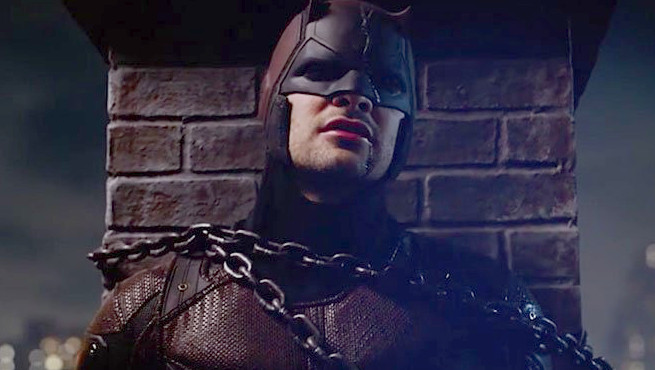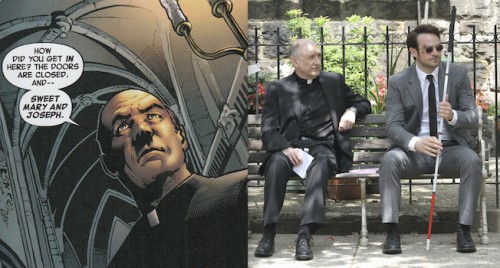
Marvel’s Catholic butt-kicker is back! Daredevil season 2 is out on Netflix for your viewing pleasure. Given the recent Easter holiday, many of us likely binged the show after binging on ham and potatoes. I mean, what else were ya gonna watch on Netflix, Fuller House? We already binged that nostalgia trip weeks ago. Keep up folks!
Daredevil’s second season is essentially an extension of its first season. The Marvel noir following the blind lawyer superhero keeps its dirty, shadowy Hell’s Kitchen backdrop, with stellar action choreography and r-rated gore. DZ listed the show “overrated” in his 2015 TV roundup, and I’m not sure season 2 will do anything to change your opinion if you agreed with him. Season 2 doesn’t get creative with the show’s formula, but it doesn’t disappoint if you liked the first season.
Spoilers to follow
https://youtu.be/m5_A0Wx0jU4
Over the show’s 13 hours, there are a lot of conflicts and themes to catch. Electra wrestles with her purpose and past. PTSD and grief manifest themselves in the wrath of The Punisher. The Stick and his warrior band of the Chaste fight rival ninjas from Hand, spoiling their attempts to unlock a superweapon. One of the season’s weaknesses is that there are so many moving parts to follow, and things can get uneven. The episodes start strong, but peter out toward the end.
Another weakness of the show is that all the best conflicts and themes this season are delegated to characters other than Daredevil. Electra and The Punisher are fun characters, Foggy and Karen wrestle with all sorts of personal struggles. Daredevil spends most of this season trying to justify himself and his style of vigilantism, and honestly, it comes off as weak. For folks accustomed to justification by works in our own lives, Daredevil’s continued wrestling with his commitment to his law-based vigilantism lifestyle seems less believable than the other character developments this season.
The show begins with the much hyped story arc between The Punisher and Daredevil. While Daredevil lets law enforcement and due process decide the fate of the bad guys, the Punisher bypasses the criminal justice system and skips straight to the death penalty. Que a Boondock Saints inspired plot about the morality of vigilante justice, especially since The Punisher is more efficient and effective at stopping the mob than Daredevil had been so far. The climax of this plot involves an inspired rooftop scene where Daredevil and The Punisher face off, not in combat, but in high moral drama over the fate of a captured mob peon.
The show then transitions into Daredevil and Electra, where a college love is rekindled and the sexual tension blows through the roof. If The Punisher was Daredevil’s foil for the effectiveness of their aligned missions, Electra is the foil to Daredevil’s heart. Her seductions are less feminine and more libidinal, attempting to convince Daredevil that he would very much enjoy the assassin lifestyle if he were to embrace it. Electra is a remorseless killer, one who has always enjoyed wielding the power of death, often out of control. She tempts Daredevil to embrace that lifestyle, to give in and enjoy the rush. Their conflict reaches a climax when, in the heat of combat, Daredevil stops Electra from killing one of The Hand’s ninjas. That ninja, taking advantage of Electra’s hesitation, slices her with a poison blade, injuring her to near death. This, alongside The Punisher’s effectiveness, causes Daredevil to seriously rethink his commitment to the sixth commandment.
As alter-ego Daredevil wrestles with his vigilante foils, Matthew Murdoch’s friendships with law partner Foggie and non-hero love interest Karen grow strained and break. At The Punisher’s trial, he oversleeps after a night of vigilante action and misses his opening statement. While questioning The Punisher on the stand, he launches into an ill-advised defense of vigilantism, which causes The Punisher to freak out and the trial to be lost. The Law Firm of Nelson and Murdoch closes its doors. Karen discovers Electra and leaves Matt, taking a reporter position at the New York Bulletin. As the season draws to a close, Matthew Murdoch embraces the rejection of his friends. They become tokens of martyrdom, sacrifices he gives up for the sake of the city.
As Daredevil is challenged by friend and foe, he refuses to quit with the self-justifying: “this is my city” he’ll say, “if I don’t do something, who will?” “Choose a better way” he says to The Punisher, “be good” he says to Electra. He refuses to be identified with assassins and killers, with outlaws and gang bangers, because he is moral and advocating for the law he’s constantly breaking. And yet, by the season’s end, Daredevil ceases to live up to his own standards. Foggy is shot, Karen is abducted, Electra killed, The Punisher helps save the day with his assault rifle, The Kingpin, Wilson Fisk, runs his prison, and Daredevil throws Nobu off the top of a building to his (eventual) death. Nowhere in that mix does Daredevil acknowledge the dissonance of his vision of justice and the vigilante lifestyle. In fact, each instance of failure ratchets up his inner martyr, adding to the collection of “yeah, but…” rebuttals used to self-justify against friend and enemy alike.
The climax of Daredevil’s self-justifying struggles come in the form of a rooftop conversation with nurse Claire Temple, where he announces his plan to fully commit to the vigilante lifestyle at the expense of a personal life. Nurse Claire is not impressed: “Maybe you need to climb down off that cross of yours and spend some time with normal people for a change.” The whole exchange is great- Clair won’t have any part in Daredevil’s righteous attempts at personal martyrdom:
Claire: “Hey, St. Matthew, enough with the hair shirt already! We’ve got doctors on it. Cops. Labs. You’re not the only person in Hell’s Kitchen that gives a shit about what’s going on here. You look like hell, you know that? You’re standing up here on this roof freezing your ass off playing guard dog when what you really need is probably three day’s sleep.”
Daredevil: “Yeah, ‘cause [villain] Nobu is going to figure out where we are, and when he does, I want to be here.”
Claire: “Of course you do.”
Daredevil: “Claire, what do you expect from me? Alright, I’m flailing here… Uh, jeez, I thought it could work. I did. The law. But it feels so useless. Everything I do just gets undone.
Claire: “You’re talking to someone who patches up the same three crack heads every night…”
Sadly, Daredevil remains unconvinced. And when Nobu’s ninjas do attack, he is there to save Claire’s life. Still, Claire is onto something: playing a better martyr, or, more accurately, playing a better savior, will not erase the specter of guilt for all Daredevil’s super hero failures. His self-justification of vigilante justice fails to cover up the fact this superhero is human and he cannot save the world.
Much has been made of Daredevil’s Catholic faith, and this season continues that story, though to a lesser extent than season one. The priest, hearing the Daredevil’s struggles with guilt and failure to protect his city and friends, gives the season’s most religious quip: “Guilt can be a good thing, it’s a soul’s call to action. The indication that your work is not yet finished.” Sadly, this quip will get thrown into plenty of works-righteous heavy handed sermonizing in coming months and years. But it illustrates the real struggle of Daredevil in season 2- though he might be a superhero, he is incapable of ending the cycle of sin in Hell’s Kitchen. The work will never be finished, so he is always guilty.
Perhaps it’s the protestant in me, but Daredevil’s struggle is much less interesting than the vengeful pseudo-justice of The Punisher, Foggy’s growing confidence as a lawyer, or The Kingpen running operations from his prison cell. With the coming Defender’s series, new superhero Iron Fist will bring his unique brand of vigilante Buddhism alongside Daredevil’s Catholicism, and I hope that brings a more fleshed out version of that Catholicism than “Let me be a martyr so I can get rid of my guilt for not saving people I love.” Get the poor guy to a communion rail, for Christ’s sake! Show Daredevil struggling with the inherent antinomianism of vigilante justice, or have him confess in earnest to his priest. Daredevil is still a good show- one I hope returns for a third season. But its weakness this season is related to the show’s religious angle, and unless that angle is readjusted, I’m not sure season two is enough to get it off DZ’s “overrated” list.

COMMENTS
Leave a Reply















